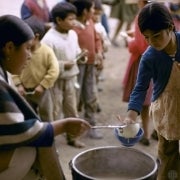 Our world is only three years away from the 2015 deadline for reaching the Millennium Development Goals (MDGs). Two global targets have been reached well ahead of schedule – according to preliminary estimates for extreme poverty the proportion of people living on less than a $1.25 a day has fallen below half its 1990 value. The same is true for the target to halve the proportion of people without access to safe drinking water.
Our world is only three years away from the 2015 deadline for reaching the Millennium Development Goals (MDGs). Two global targets have been reached well ahead of schedule – according to preliminary estimates for extreme poverty the proportion of people living on less than a $1.25 a day has fallen below half its 1990 value. The same is true for the target to halve the proportion of people without access to safe drinking water.
A few more MDGs are in sight of the finish line. These are primary school completion rate and gender equality in primary and secondary education.
However, some others will need a real push, particularly child and maternal mortality and access to improved sanitation facilities. Hence, it is too early to claim that the mission has been accomplished, especially when we look at individual countries and achievements per region. Disparities among regions and countries remain large and much remains to be done to make progress towards the MDGs a reality for all.
The past year has also shown that serious global and regional economic challenges remain a threat to progress towards the MDGs. Clearly, the global economic recovery remains fragile and its potential adverse implications on the ability of developing nations to make progress and of the developed world to provide the promised and much needed assistance should not be underestimated.
The Global Monitoring Report 2012: Food Prices, Nutrition, and the Millennium Development Goals, launched today, underscores the need for helping developing countries deal with the adverse effects of food price spikes, as higher and more volatile food prices have affected progress across the MDGs.
The recent food price spikes of 2007/08 and 2010/11 have prevented millions of households from escaping poverty, with urban and female-headed households especially vulnerable. Diverse evidence shows that the quantity and quality of nutrition is adversely affected through higher food prices, which does not bode well for the MDGs related to nutrition, child and maternal mortality. This is compounded by the findings that proper nutrition in the first two years of a child’s life are critical and that even a temporary reduction in nutritional intake due to higher food prices can affect children’s long-term development. Indeed, nutritional implications can set back a whole generation. So, unmistakably, countries need to become more resilient to food price spikes.
Solutions to make countries and communities more resilient in a sustainable manner are known. GMR 2012 advocates using agricultural policy to mainly orchestrate a supply response, use social safety nets to improve resilience, strengthen nutritional policy to manage the implications of early childhood development and trade policy to improve access to food markets, reduce volatility and induce productivity gains.
The implications of high and volatile food prices vary widely at the regional and country level and the GMR 2012 includes insights on each developing region and each MDG .
The report also makes the point that various international financial institutions could have done and should do better, particluarly with respect to resource flow availability for basic nutrition. Resources coming from the multilaterals for basic nutrition interventions have been low and there is a need to intergrate nutrition interventions in our operations when and wherever possible. All of us, traditional donors, new donors, philantrophist, and NGOs, should continue to help developing countries enhancing their absorptive capacity such that their policy effectiveness improves while strengthening aid effectiveness and accountability.
With 2015 around the corner, a lot still needs to be done to help countries achieve the MDGs. We owe it to people living in developing countries to escape poverty, overcome malnutrition, and in general achieve a better quality of life.


Join the Conversation